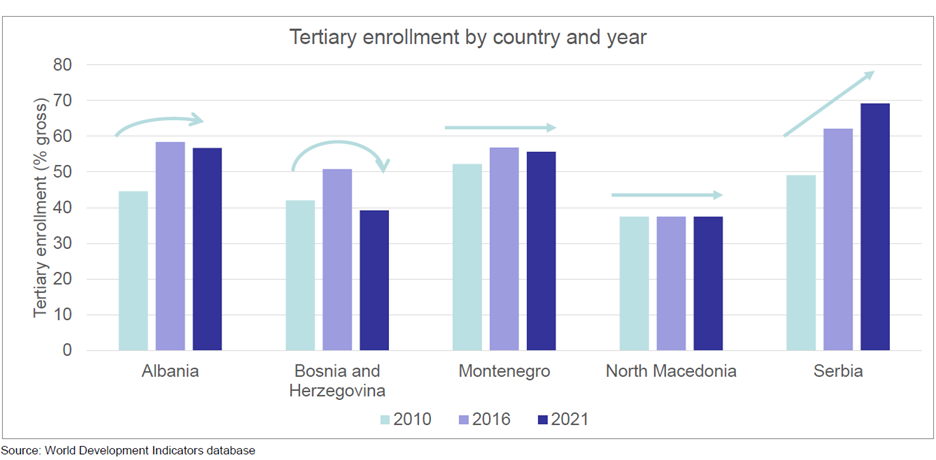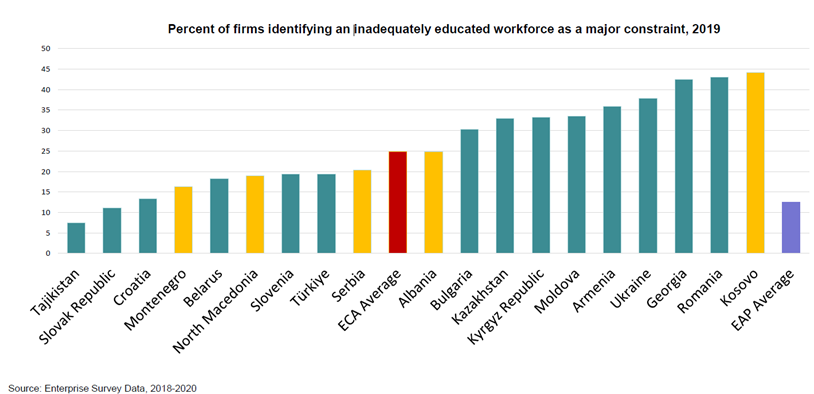Education policy and development in the Western Balkans

The Western Balkans region – comprising Albania, Bosnia and Herzegovina, Kosovo, Montenegro, North Macedonia and Serbia – stands at a critical juncture in its history. While it has made commendable strides in economic and social progress over the past two decades, it faces unique and pressing challenges on its path to development. In this blog post, we will dive deep into the trends and policy developments that are of utmost relevance to higher education policymakers and practitioners in the Western Balkans. We will explore the region's aspirations for European Union (EU) accession, the pivotal role of education reform, the transformative impact of the digital age, and the imperative transition toward a sustainable, green economy.
EU accession is a collective aspiration of Western Balkan countries, with four being candidates (Albania, Montenegro, North Macedonia and Serbia), and two (Bosnia and Herzegovina and Kosovo) in the status of potential candidates. The journey toward accession involves bilateral Stabilisation and Association Agreements, wide-ranging trade agreements, financial assistance through the Instrument for Pre-accession Assistance, and regional cooperation. Recent developments, such as the Enlargement Package and the Economic and Investment Plan, have charted a new course, aiming to stimulate economic recovery, support green and digital transitions, and foster regional integration into the EU.
Education reform: The cornerstone of development
Despite the considerable progress made, the region continues to lag behind its European counterparts in terms of human capital development. The World Bank Human Capital Index starkly illustrates this gap, revealing that children born in the Western Balkans may only be two-thirds as productive when they reach adulthood as they could be with complete education and full health. This underscores the pressing need for comprehensive educational improvement.
Tertiary education assumes a pivotal role in the Western Balkans' development, especially in light of EU accession aspirations
Though the Western Balkans have made some progress in terms of learning outcomes, it has been slower than desired due to challenges related to foundational literacy. For instance, while Serbian students perform well in mathematics and science at grade 4, by age 15, a significant percentage perform below the basic proficiency level. This challenge is mirrored in Bosnia and Herzegovina, North Macedonia and Kosovo. Alarming data indicates that very few students across the region have mastered the advanced higher-order skills that are pivotal for driving future economic growth, posing a substantial challenge to the tertiary education attainment and subsequent development of the region. The following graph shows how enrolment patterns in tertiary education differ within the region.

Tertiary education assumes a pivotal role in the Western Balkans' development, especially in light of EU accession aspirations. However, knowledge gaps and quality concerns are prevalent in the region's tertiary education institutions. Most of the countries in the region are full members of the Bologna Process, except Kosovo. Though higher education laws and strategies for the adoption of the Bologna principles have been introduced throughout the region, the concern remains that they were not applied strictly enough to allow profound reforms of teaching practices and curricula. Challenges exist in particular in the areas of transparency, transferability, recognition and quality of teaching.
Limited reforms in tertiary education in recent years have led to a concerning decline in university rankings. Furthermore, skills gaps are an acute concern for exporting firms, hampering their competitiveness. The Enterprise Survey Data (2018–2020) show that firms in the Western Balkans – particularly Albania and Kosovo – have difficulties to find workers with the "right" skills mix. The graph below shows comparison with countries in Europe and Central Asia (ECA), as well as East Asia and Pacific (EAP) countries average.

The complex landscape of the Western Balkans
The Western Balkans, while facing common challenges, also exhibits considerable variation across its countries. Common challenges and priorities include:
1. Digital skills: The need for improved digital skills is a common thread across the region. The digital age demands a digitally literate workforce and addressing this gap is crucial.
2. Green transition: The transition toward a sustainable, green economy is paramount. This shift necessitates not only policy changes but also a skilled workforce ready to embrace and drive green initiatives.
3. Out-migration to the EU: The Western Balkans have experienced significant out-migration to EU countries, particularly among young and educated individuals. While migration brings with it significant opportunities, it also poses challenges for the region.
4. Institutional autonomy and governance: Faculties in the Western Balkans often enjoy a high level of institutional autonomy. While this autonomy can foster innovation, it can also lead to fragmentation and challenges in coordination and governance.
5. Prevalence of secondary VET: In some Western Balkan countries, secondary vocational education and training (VET) serves as a common pathway to higher education. Ensuring the quality and alignment of VET programs with labour market needs is essential.
6. Inequality of outcomes: Inequality in educational outcomes is a persistent issue in the region, and addressing this gap is crucial for inclusive development.
Given the growing needs of Western Balkans economies and societies, there are compelling reasons to focus on these critical areas:
• Skills Gaps: Enterprise surveys reveal a significant skills gap, particularly among exporting firms that are highly integrated into the global economy. Exploring short-cycle tertiary education programmes can help address these urgent labour market needs.
• Loss of competitiveness: The decline in university rankings over time is a concerning trend. Revitalising tertiary education is crucial to restoring competitiveness.
• Regional integration and Berlin Process: Tertiary education offers opportunities for regional integration into the European Higher Education Area (EHEA) and alignment with the Berlin Process, furthering the Western Balkans' EU aspirations.
• Adopting STEER framework: Countries in the region, education policymakers, and stakeholders might consider adopting five principles to STEER tertiary systems and institutions toward greater relevance and impact:
o Building diversified Systems;
o Investing smartly in new Technologies;
o Ensuring Equity in access and financing;
o Achieving Efficiency in resource utilisation; and
o Acquiring Resilience in service delivery so that learning continues.
Pioneering change in a dynamic region
The Western Balkans region stands at a critical crossroads in its journey toward economic development and EU accession. Education reform, digital transformation and the transition to a sustainable, green economy stand as the three pillars guiding this monumental effort. Addressing the challenges in learning outcomes, improving tertiary education and fostering skills development are vital steps on this path. Furthermore, nurturing regional cooperation and raising awareness among citizens are paramount for ensuring the sustainable development of this dynamic region.
By addressing its unique challenges and harnessing its unique features, we can help unlock the immense potential of the Western Balkans
As higher education practitioners and policymakers, we share a collective responsibility to support these endeavours and catalyse positive change in this vibrant and promising part of the world. By addressing the unique challenges and harnessing the region's unique features, we can help unlock the immense potential of the Western Balkans and pave the way for a brighter future for all its citizens.






